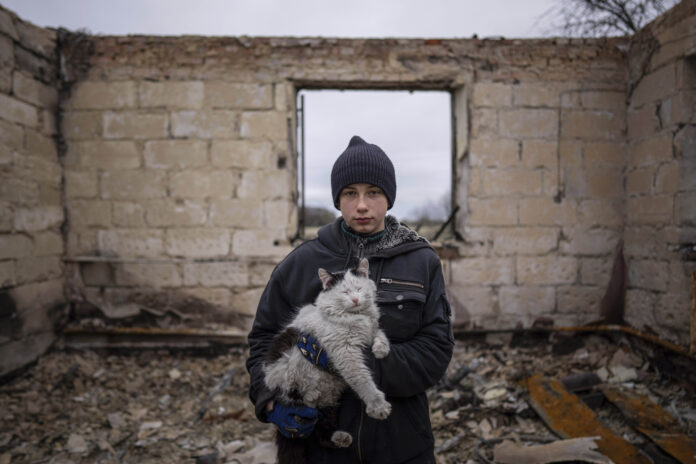Almost three decades after the horrors of the Rwandan genocide, Roméo Dallaire says he worries too little has changed.
“The West has learned absolutely nothing,” said the former United Nations force commander in an interview with The West Block‘s Mercedes Stephenson.
“What the international community and the developed world in particular has discovered is that it doesn’t want to take risks.”
Dallaire spoke as international focus is shifting to whether Russia‘s atrocities in Ukraine constitute a genocide — and if so, whether world leaders are willing to uphold their responsibility to protect.
As the former UN commander, Dallaire witnessed the horrors of the 1994 genocide in Rwanda, as well as the futility of global condemnations without the willingness to act to force an end to the violence.
What’s behind some countries’ decisions to stay neutral in Russia’s war with Ukraine?
As a leading voice now on genocide prevention and the responsibility to protect, he says the work of human rights investigators is critical to determining whether the atrocities happening on the ground in Ukraine by Russian forces amount to the definition of genocide.
“The international community signed up that if there is a genocide, we all have a responsibility to stop it — to stop it — which means to engage in stopping it, not watching it,” Dallaire emphasized.
The key question for the investigators will be whether the “massive abuses of human rights” made clear as Russian forces retreated over recent weeks from the area around Kyiv were carried out by rogue commanders or troops, or carried out on the direction of the Russian government.
“That is why we need those international human rights inspectors to be on the ground and start conclusive work in regards to whether or not this is truly a genocide.”
Responsibility to protect is the doctrine agreed to in 2005 by United Nations member states that set on them the responsibility to use “appropriate diplomatic, humanitarian and other peaceful means” to protect people from genocide, war crimes, ethnic cleansing and crimes against humanity.
If peaceful means fail, and on a case-by-case basis, the doctrine also affirmed that member states could act through the UN Security Council to take “collective action, in a timely and decisive manner.”
How far are world leaders willing to go to punish Russia? – Apr 4, 2022
In the weeks since Russian President Vladimir Putin launched his unprovoked and bloody invasion of the sovereign democracy on Feb. 24, the world has watched in horror as his forces inflict repeated atrocities on Ukrainian civilians. Systematic rapes and sexual violence, the alleged use of chemical weapons, bombing a maternity hospital and mass killings of civilians are all among the reported violence.
Trending Stories
South Carolina mall shooting leaves 14 injured, suspect arrested
Should you rent or buy a home? Why that calculation might be changing
Defence Minister Anita Anand said in an interview with The West Block there appears to be a “strong argument” that Putin’s forces are inflicting genocide on the Ukrainian people.
“These are unbelievable, horrific crimes, and whether there is the use of chemical weapons or nuclear weapons, we have to acknowledge what is occurring on the ground right now in Ukraine,” Anand said.
“The definition of genocide includes the intent to wipe out a nation in whole or in part, and I believe that there’s strong arguments to be made that this is indeed a genocide.”
Her comments echo remarks from Prime Minister Justin Trudeau last week that it is “absolutely right” to weigh whether Russia’s actions amount to genocide — a phrase levied by U.S. President Joe Biden on April 12 in a significant escalation of rhetoric against Putin.
“Yes, I called it genocide because it has become clearer and clearer that Putin is just trying to wipe out the idea of being able to be Ukrainian and the evidence is mounting,” Biden told reporters.
“We’ll let the lawyers decide internationally whether or not it qualifies, but it sure seems that way to me.”
‘All hands on deck’ for Canada’s Ukraine response: Anand
Global News has also learned the government is considering sending military armoured vehicles to Ukraine, including tanks and light-armoured vehicles.
Anand did not confirm the information shared by military sources, but noted the government promised in the most recent federal budget to provide an additional $500 million worth of military aid to Ukraine.
“I have nothing to announce at this time, but I will say that we are taking an all-hands-on-deck approach to ensure that we are responding effectively to the items that Minister Reznikov, my counterpart in Ukraine, has indicated Ukraine needed,” Anand said.
While Russia had been widely expected to overtake Ukraine within days of the invasion, the fierce and courageous defence by Ukrainians of their homeland has stirred awe and determination from Western leaders to support their efforts.
Russia-Ukraine conflict: Trudeau agrees with Biden’s assessment that Russia committing ‘genocide’ in Ukraine
NATO allies, including Canada, are pouring millions of dollars worth of military aid — including lethal weapons — into Ukraine, and have laid unprecedented sanctions.
But what world leaders can do and what they are willing to do are often two very different things.
For many Ukrainians, the lack of more aggressive actions such as allied targeting of Russian oil and gas products remains “incredibly frustrating,” said singer-songwriter Chantal Kreviazuk, who is of Ukrainian descent and is working with the Ukrainian World Congress on the #UniteWithUkraine initiative.
“Ukrainians are not leaving Ukraine or they’re not giving up on Ukraine. That is their land. That is their home. They don’t have another home,” she said.
“So they’re not going to stop defending it.”
— with a file from Global’s Mercedes Stephenson.
© 2022 Global News, a division of Corus Entertainment Inc.



